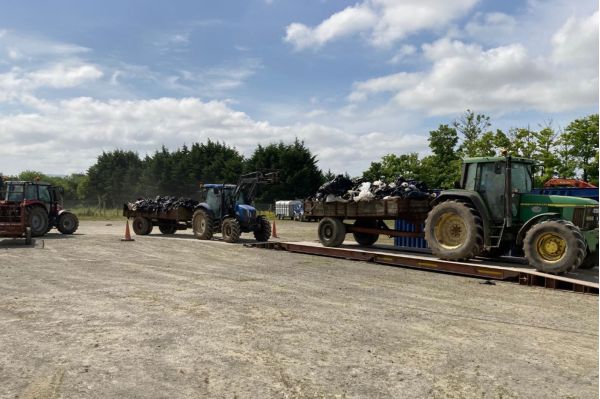Irish farmers recycle plastic from 20 million bales

The vast majority of the plastic was collected at 200 bring centres, coordinated by the IFFPG and located in marts, co-ops and agri-merchants. Almost 40 per cent of what was collected was processed at Irish recycling facilities, representing a boost to the circular economy in Ireland, according to the IFFPG.
Farm plastics recycling in Ireland is coordinated by IFFPG, which is the national farm plastics compliance scheme. IFFPG, which is a not-for-profit body, has recycled almost 500,000 tonnes of farm plastics waste since its establishment in 1998. The scheme is funded by both the farm plastics industry and farmers, and approved by the Minister for the Environment. It is an excellent example of what can be achieved when key stakeholders in a sector come together to work for the betterment of the environment, says the IFFPG.
More than 38,000 tonnes of silage wrap and pit cover waste were recycled in 2023, which represented a record 95 per cent recycling rate. Collection figures at some bring centres were impressive. For example, 550 tonnes of waste was collected at Kilmallock bring centre which is the equivalent to plastic from 275,000 silage bales, while 582 farmers used the Ballinarobe bring centre over a two-day period.
The volume of farm plastics recycled has increased by 40 per cent in the last five years alone. This significant increase can be attributed to more plastic going on the market due to the abolition of the milk quota, better grassland management and more recently Bord Bia inspections. For Irish farmers, farm plastics recycling has become a mainstream activity, with their local bring-centre considered both the most convenient (average distance of six miles for farmers) and cost effective (€50 charge for plastic from 250 bales) means of managing their waste plastic. These factors, as well as a desire by farmers to be environmentally responsible, have resulted in the recycling rate for farm plastics being consistently the highest for any plastic waste stream in the country.
In 2023, IFFPG supplied almost 40 per cent of collected material to Irish facilities and in doing so fully met their intake requirements. In the case of both Enva in Carrickmacross and Sabrina in Littleton, silage wrap and pit covers are recycled into pellets which are later sold to manufacturers for conversion into construction film, refuse sacks and garden furniture. In the case of IFF Ltd, a recycler based in west Clare, an example of the circular economy in action can be seen as this company coverts fertiliser bag waste into fence posts for sale to Irish farmers. Farm plastics waste which cannot be recycled in Ireland is exported under strict waste legislation for recycling elsewhere in Europe.
However, record recycling levels in recent years at a time of escalating recycling costs due to global events such as the Covid-19 pandemic and the war in Ukraine have dramatically increased costs to IFFPG, it says. For example, the scheme’s overall costs increased from €3m in 2018 to €8m in 2023. This, according to IFFPG, has necessitated increases to both the recycling levy and collection charges in recent years, with the minimum collection charge increasing from €35 to €50 per half tonne at bring centres this year.





